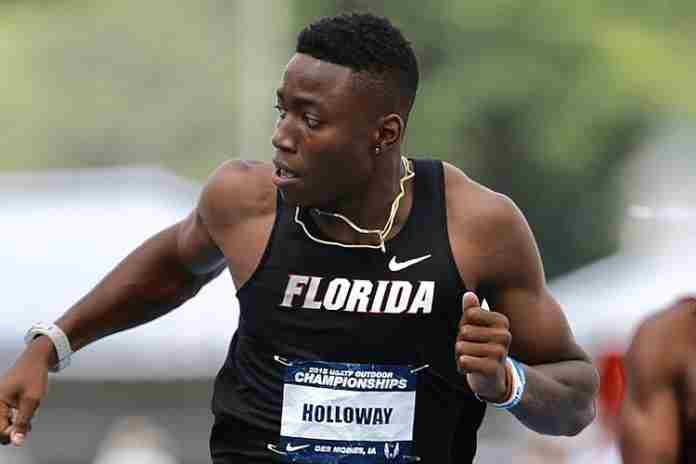One of the hallmarks of the U.S. qualifying system in track & field is earning your place. With few exceptions, if you want to be on the American team for the Olympic Games or World Championships, you have to beat essentially everyone else in the U.S.
For the 2019 IAAF World Championships in Doha (QAT), the USA Track & Field National Championships at Drake Stadium in Des Moines, Iowa is the gateway. The competition in many of the events will be especially fierce; our preview of each men’s event – women’s preview on Wednesday – focuses on the leading declared performers based on 2019 marks:
● 100 m:
1. 9.81 ~ Christian Coleman
2. 9.87 ~ Justin Gatlin
3. 9.93 ~ Cravon Gillespie
4. 9.99 ~ Isaiah Young
5. 10.00 ~ Mike Rodgers
Noah Lyles (9.86) opted out of this event to concentrate on the 200 m, and Gatlin has a wild-card entry into the Worlds as defending champion, so third through fifth could be very meaningful here. Where’s Ronnie Baker? The world leader for much of 2018, who ran 9.87, hasn’t been seen so far in 2019, but is entered and declared. Gillespie has been the surprise of the season and has continued his NCAA heroics with solid running in Europe.
● 200 m:
1. 19.50 ~ Noah Lyles
2. 19.82 ~ Kenny Bednarek
3. 19.91 ~ Christian Coleman
4. 20.04 ~ Andrew Hudson
5. 20.09 ~ Micaiah Harris
Michael Norman (19.70) and Cravon Gillespie (19.93) are skipping this event, which is all about Lyles right now after his 19.50 screamer at the Lausanne Diamond League meet. As Lyles is odds-on to win the Diamond League this season, the U.S. could get four in the Worlds in Doha. Bednarek had that fabulous double at the NJCAA Nationals, but hasn’t been that good in his European races. So what about last season’s winner Ameer Webb? He’s only run the 200 m once this year, a 20.64 at the Mt. SAC Relays in April. Is he in shape?
● 400 m:
1. 43.45 ~ Michael Norman
2. 44.23 ~ Kahmari Montgomery
3. 44.25 ~ Trevor Stewart
4. 44.49 ~ Fred Kerley
5. 44.63 ~ Wil London II
With Olympic and World Champion Wayde van Niekerk (RSA) still recovering from surgery, Norman is the favorite for Doha and could also win the Diamond League, giving the U.S. a fourth entry. Montgomery has been OK in his post-NCAA meets, but will be well rested. Stewart won the NACAC title in 45.01 and Kerley and London are veterans. This will be a deep field in Des Moines, which means Norman might be juiced to do something special.
● 800 m:
1. 1:43.63 ~ Donavan Brazier
2. 1:44.41 ~ Bryce Hoppel
3. 1:44.47 ~ Clayton Murphy
4. 1:45.39 ~ Brandon Kidder
5. 1:45.58 ~ Quamel Prince
Brazier, at 22, is suddenly the veteran, along with Olympic bronze medalist Murphy, but what about NCAA champ Hoppel? Only five months younger than Brazier, he ran 1:44.48 at the Sunset Tour in Azusa, California two weeks ago, but has run 16 800 m races so far this season and is undefeated in 12 meets. Is he ready for national spotlight?
● 1,500 m:
1. 3:35.14 ~ Henry Wynne
2. 3:35.77 ~ Brannon Kidder
3. 3:35.32 ~ Craig Engels
4. 3:36.22 ~ Ben Blankenship
5. 3:36.49 ~ Johnny Gregorek
What kind of shape is Matthew Centrowitz in? He ran 3:52.26 for sixth in the Pre Classic mile, but did not finish in the Sunset Tour 5,000 m. He’s the key to this race; without him, it’s wide open for someone to steal in the last 200 m.
● 3,000 m Steeple:
1. 8:08.41 ~ Hillary Bor
2. 8:15.94 ~ Stanley Kebenei
3. 8:16.52 ~ Andy Bayer
4. 8:25.65 ~ Jordan Mann
5. 8:27.29 ~ Mason Ferlic
Evan Jager is out with a foot injury and hasn’t competed all year. That leaves the way open for Bor and Kebenei, both of whom have run well on the international circuit and have a rare chance for a national title, as Jager has won the last seven in a row.
● 5,000 m:
1. 13:05.70 ~ Paul Chelimo
2. 13:09.81 ~ Ben True
3. 13:17.23 ~ Kirubel Erassa
4. 13:21.18 ~ Drew Hunter
5. 13:22.28 ~ Josef Tessema
● 10,000 m:
1. 27:32.89 ~ Kirubel Erassa
2. 27:34.01 ~ Leonard Korir
3. 27:58.67 ~ Reid Buchanan
4. 28:09.88 ~ Jacob Thomson
5. 28:11.30 ~ Connor McMillan
Chelimo talked about doubling at the Worlds, but missed the 10,000 qualifying standard and will concentrate on the 5,000 m, where he is a medal contender thanks to being one of the best tacticians in the world. The Doha entry standards could be an issue depending on who finishes where: 13:22.50 and 27:40.00.
● 110 m hurdles:
1. 12.98 ~ Grant Holloway
2. 13.00 ~ Daniel Roberts
3. 13.33 ~ Devon Alen
4. 13.36 ~ Freddie Crittenden
5. 13.37 ~ Dashaun Jackson and Isaiah Moore
The new generation of American hurdlers are here and Holloway and Roberts are 1-2 on the world list from their titanic battle at the NCAA Championships. Holloway won his one European meet (13.16) earlier this summer and Roberts (13.11) was second in Lausanne. After their long collegiate seasons, the long rest before the USATF meet could be just what they need to be refreshed.
● 400 m hurdles:
1. 47.16 ~ Rai Benjamin
2. 48.48 ~ Quincy Hall
3. 48.71 ~ Norman Grimes
4. 48.72 ~ Amere Lattin
5. 48.99 ~ David Kendzeira
Benjamin has been one of the sensations of 2018 and 2019 and has his opportunity to win his first U.S. national title. Can any of the veterans, like 2016 Olympic champ Kerron Clement (51.47 in his only race this season), T.J. Holmes (49.25) or Johnny Dutch (49.26) get something going? Hall, Grimes and Lattin were 1-2-3 at the NCAAs.
● High Jump:
1. 2.28 m ~ Jeron Robinson (7-5 3/4)
2. 2.27 m ~ Jordan Wesner (7-5 1/4)
2. 2.27 m ~ Ernie Sears (7-5 1/4)
4. 2.25 m ~ Keenon Laine (7-4 1/2)
5. 2.24 m ~ Shelby McEwen and Zack Anderson (7-4 1/4)
Robinson has been the best American this season, but more importantly, the Doha qualifying standard is 2.30 m (7-6 1/2). That will shape the competition as much as the entrants.
● Pole Vault:
1. 5.95 m ~ San Kendricks (19-6 1/4)
1. 5.95 m ~ Chris Nilsen (19-6 1/4)
3. 5.81 m ~ Cole Walsh (19-0 3/4)
4. 5.77 m ~ Zach Bradford (18-11)
5. 5.75 m ~ Clayton Fritsch (18-10 1/4)
Kendricks has a pass into the Worlds as defending champ, so three more can go if they have achieved the 5.71 m (18-8 3/4) qualifying standard. Nilsen won the NCAA meet over Mondo Duplantis (SWE), but now needs to move up into the professional world. Walsh has been all over the Diamond League and holding his own; a Worlds appearance would help advance him considerably.
● Long Jump:
1. 8.38 m ~ Jeff Henderson (27-6)
2. 8.25 m ~ Steffin McCarter (27-0 3/4)
3. 8.21 m ~ Will Claye (26-11 1/4)
4. 8.18 m ~ Trumaine Jefferson (26-10)
5. 8.15 m ~ Damarcus Simpson (26-9)
Believe it or not, the Worlds qualifying standard is 8.17 m (26-9 3/4), so that will be an issue if someone lower on the list pops up into the top three. Rio Olympic winner Henderson has been wildly inconsistent all year, and is Will Claye physically OK after some issues at the Monaco Diamond League triple jump? McCarter was 10th at the NCAA meet for Texas, then jumped 8.25 m (27-0 3/4) at Chula Vista on 13 July. Really? His next-best jump ever is 7.96 mi (26-1 1/2) indoors in 2018.
● Triple Jump:
1. 18.14 m ~ Will Claye (59-6 1/4)
2. 17.82 m ~ Christian Taylor (58-5 3/4)
3. 17.68 m ~ Omar Craddock (58-0 1/4)
4. 17.43 m ~ Donald Scott (57-2 1/4)
5. 16.99 m ~ Armani Wallace (55-9)
Taylor is the reigning World Champion, so the U.S. can get Claye, Craddock and Scott to Doha if they finish in the top four with Taylor. U.S. triple jumping has never been this good or this competitive in depth, but how well in Claye after his Monaco injury?
● Shot Put:
1. 22.74 m ~ Ryan Crouser (74-7 1/4)
2. 21.85 m ~ Darrell Hill (71-8 1/4)
3. 21.63 m ~ Jon Jones (70-11 3/4)
4. 21.59 m ~ Jordan Geist (70-10)
5. 21.46 m ~ Joe Kovacs (70-5)
Crouser won the national title in 2016 and 2017, Hill won in 2018 and Kovacs was USATF champ in 2014 and 2015. Crouser and Hill appear to be locks for Doha if they are in health; it will be quite a struggle for the third spot!
● Discus:
1. 67.13 m ~ Mason Finley (220-3)
2. 66.67 m ~ Reggie Jggers (218-8)
3. 65.42 m ~ Brian Williams (214-7)
4. 65.29 m ~ Sam Mattis (214-2)
5. 64.60 m ~ Rodney Brown (211-11)
Finley won the 2016 and 2017 national titles, plus a bronze medal in London in 2017. Jagers was a surprise winner last year in Des Moines, but has been competitive on the international circuit. The qualifying standard for Doha is in play here, at 65.00 m (213-3)
● Hammer:
1. 77.59 m ~ Sean Donnelly (254-6)
2. 76.49 m ~ Alex Young (250-11)
3. 75.61 m ~ Rudy Winkler (248-0)
4. 75.55 m ~ Daniel Haugh (247-10)
5. 75.28 m ~ Conor McCullough (247-0)
The Doha qualifying standard of 76.00 m (249-4) could be a severe stumbling block for U.S. entries of Donnelly and Young don’t go 1-2, or the event proves to be better than expected. Donnelly ranks ninth on the world list for 2019; Young is 20th.
● Javelin:
1. 80.25 m ~ Michael Shuey (263-3)
2. 79.28 m ~ Riley Dolezal (260-1)
3. 78.82 m ~ Curtis Thompson (258-7)
4. 77.15 m ~ Mark Minichello (253-1)
5. 76.72 m ~ Nick Howe (25-18)
Dolezal was national champ in 2013 and 2017, but with a Worlds qualifying standard of 83.00 m (272-4) and Shuey standing 45th on the world list right now, it’s very possible that no one from the U.S. will be able to throw in Doha.
● Decathlon:
1. 8,344 ~ Zach Ziemek
2. 8,130 ~ Solomon Simmons
3. 8,112 ~ Harrison Williams
4. 8,094 ~ Scott Filip
5. 7,924 ~ Devon Williams
Ziemek compiled his best score since 2016 with his 8.344 runner-up at the Decastar meet in Talence earlier this year, so he’s on the rise once again. He’s the only one with the qualifying standard of 8,200 points, so look for Simmons, Williams and Filip to aim for that score more than worry about placements.
There is prize money in this meet of $8,000-6,000-5,000-4,000-3,000-2,000-1,000-1,000 for the top seven placers.
NBCSN has coverage on Friday at 7 p.m. Eastern time, on NBC on Saturday at 4 p.m. Eastern and on Sunday on NBC from 8 p.m. Eastern time. Look for results link here.


















